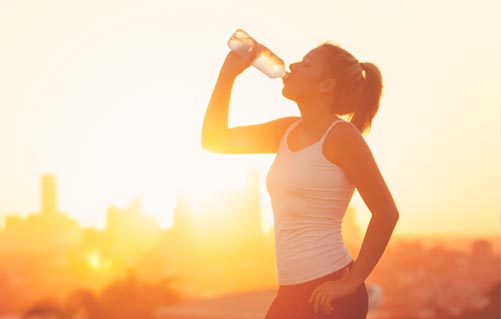
Exercise often. Maintain a healthy weight. Eat a nutritious diet. Don’t smoke. You’re already aware of the basics that make up a heart-healthy lifestyle. But there’s a lesser-known habit that’s also important for protecting your ticker, especially during the heat of summer: getting enough fluids.
“Your heart pumps about 2,000 gallons of blood a day. Staying hydrated makes it easier for your heart to pump blood more easily throughout your body, allowing your muscles to work more efficiently and helping prevent dizziness, swelling and heatstroke,” said Lourdes cardiologist John Hamaty, DO, FACC, FACOI.
Why We Need Water
Your body is about 60 percent water. Water is needed for survival and to rid the body of wastes, keep your temperature normal, lubricate and cushion joints, and protect sensitive tissues.
There’s no magic number for how much liquid you need to stay hydrated. It can vary day to day depending on the weather, how active you are and your clothing. Also important are:
- Your age
- If you are managing a condition like heart failure, diabetes, obesity, liver disease or kidney disease
- The medications you take, such as diuretics, nonsteroidal anti-inflammatory drugs and some antidepressants
- Your circulatory system
- How much you sweat
The U.S. Centers for Disease Control and Prevention does not recommend daily water intake. Many experts say a healthy person should consume eight 8-ounce glasses of water—which equals about 2 liters, or half a gallon—per day. This is called the 8x8 rule. Others, however, call for a higher amount: 2.7 liters a day for women and 3.7 liters for men.
Avoid Dehydration
You should drink water throughout the day, not just during physical activity. For example, sitting in the sun on a hot or humid day can cause your body to lose fluids.
To make sure you’re getting enough, check the color of your urine. If it’s pale or clear, you’re in a good zone. If it’s dark yellow, it means you need to up your intake.
“Thirst isn’t the best indicator that you need to drink. In fact, by the time thirst strikes, your liquid levels are already too low,” said Dr. Hamaty. “Other symptoms of dehydration include heart palpitations, low blood pressure, weakness, dizziness and confusion.”
Up Your Fluid Intake
Drinking water is the best way to stay hydrated, but it isn’t the only one. Many other foods and drinks are smart sources of fluids, too. These include:
- Fruits and vegetables such as watermelon and tomatoes
- Broth-based soup such as minestrone
- Fat-free or low-fat milk
It’s best to steer clear of sugary drinks such as fruit juice and soda, since they add unnecessary sugar and calories. Sports drinks with electrolytes may be useful for people doing high-intensity exercise, but they can be high in added sugars and calories.
You may also want to limit your consumption of caffeine and alcohol. Both can cause you to become dehydrated faster by making you urinate more frequently.
“People with conditions like heart failure and diabetes often have fluid intake limits,” said Dr. Hamaty. “If you have any questions about hydration and your health, talk with your doctor.” |
